|
|
|
Sort Order |
|
|
|
Items / Page
|
|
|
|
|
|
|
| Srl | Item |
| 1 |
ID:
103644
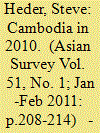

|
|
|
|
|
| Publication |
2011.
|
| Summary/Abstract |
Prime Minister Hun Sen's power became more concentrated. The economy expanded but was said to need diversification. Inequality intensified conflicts, but development generated legitimacy, while the political opposition and civil society were attacked. A U.N.-assisted court convicted five ex-Khmer Rouge leaders. Ties with China, the U.S., and Thailand improved.
|
|
|
|
|
|
|
|
|
|
|
|
|
|
|
|
| 2 |
ID:
145447
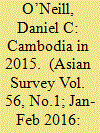

|
|
|
|
|
| Summary/Abstract |
The political compromise and cooperation established in 2014 between Prime Minister Hun Sen’s long-ruling Cambodian People’s Party and opposition leader Sam Rainsy’s Cambodian National Rescue Party (CNRP) continued into 2015, highlighted by electoral reforms in March. However, by mid-year, CNRP criticism of Hun Sen led to a crackdown and the self-imposed exile of Rainsy and other high-ranking members of the opposition.
|
|
|
|
|
|
|
|
|
|
|
|
|
|
|
|
| 3 |
ID:
152258
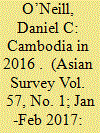

|
|
|
|
|
| Summary/Abstract |
The conflict between Prime Minister Hun Sen’s Cambodian People’s Party and opposition leader Sam Rainsy’s Cambodian National Rescue Party continued throughout 2016, with Rainsy remaining in self-imposed exile in France and the government making numerous arrests of opponents who remained in Cambodia. With the 2018 National Assembly elections on the horizon, Hun Sen appeared to be cracking down on and dividing the opposition in an effort to prevent a repeat of the strong CNRP electoral performance in 2013.
|
|
|
|
|
|
|
|
|
|
|
|
|
|
|
|
| 4 |
ID:
086473


|
|
|
|
|
| Publication |
2009.
|
| Summary/Abstract |
No one will ever know exactly how many people died from executions, starvation and disease during the Khmer Rouge's reign to terror, which lasted for three years, eight months, and 20 days, from April 1975 to January 1979.
|
|
|
|
|
|
|
|
|
|
|
|
|
|
|
|
| 5 |
ID:
163345
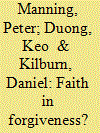

|
|
|
|
|
| Summary/Abstract |
This article explores stories of former members of the Khmer Rouge who have converted to Christianity. It sheds light on the intersections of patterns of religious change in Cambodia, which implicates peace-building, redress, and development trajectories in the wake of conflict and atrocities. The case raises important questions about why former members of the Khmer Rouge convert to Christianity and the social, political, and ethical implications of their conversions. We explore these questions to show that, while transitions and attendant redress efforts in Cambodia have been principally explained at the level of the state, we should pay closer attention to the granular experiences of former Khmer Rouge members as they navigate Cambodia’s changing post-conflict terrain, and the social and cultural sites through which they have made their experiences of the past meaningful.
|
|
|
|
|
|
|
|
|
|
|
|
|
|
|
|
| 6 |
ID:
080368
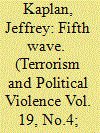

|
|
|
|
|
| Publication |
2007.
|
| Summary/Abstract |
This article builds on David Rapoport's Four Waves Theory by identifying several anomalous movements which did not appear to precisely fit with the internationalist model posited in Rapoport's Four Waves. Specifically, groups which I have called Fifth Wave movements have turned inward, becoming localistic rather than international, and manifest intense ethnic, racial, or tribal mysticism. They are millenarian and chiliastic in nature, and seek to create a new society - based on the creation of new men and women - in a single generation. Fifth Wave movements thus focus strongly on women and see children as the vanguard of their movements. Following this logic, rape is their signature tactic and child abduction their normal recruiting practice. This study posits the pre-state Khmer Rouge in Cambodia as the avatar of the current Fifth Wave, but finds that after a nearly generation-long hiatus, the fifth wave in its fully modern form emerged in Africa with the Lord's Resistance Army in Uganda as its paradigmatic exemplar
|
|
|
|
|
|
|
|
|
|
|
|
|
|
|
|
| 7 |
ID:
138154
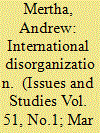

|
|
|
|
|
| Summary/Abstract |
Observers of China take for granted that Chinese domestic politics are highly fragmented. At the same time, they tend to relax these assumptions when analyzing China as an international actor. The thesis of this article is that domestic institutional fragmentation in Chinese bureaucratic politics carries over into its international behavior. Using the historical case of Chinese foreign assistance to Democratic Kampuchea, this article demonstrates that the effectiveness of Chinese foreign aid—and the influence that comes with it—is only as good as the domestic institutions that manage the bilateral relationship. This has implications for understanding the veracity of Chinese global influence today as well as refocusing attention to the domestic constraints on Beijing’s international behavior.
|
|
|
|
|
|
|
|
|
|
|
|
|
|
|
|
| 8 |
ID:
125215
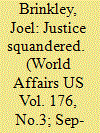

|
|
|
|
|
| Publication |
2013.
|
| Summary/Abstract |
Cambodian Prime Minister Hun Sen was preparing to fight a civil war in 1997 when a senior United Nations official stopped by to ask if he'd like help putting the former leaders of the Khmer Rouge on trial. With a figurative wave of the hand, Hun Sen, a former Khmer Rouge commander himself, said in effect: Sure, go ahead. At that moment, his mind was obviously elsewhere.
|
|
|
|
|
|
|
|
|
|
|
|
|
|
|
|
| 9 |
ID:
181033


|
|
|
|
|
| Summary/Abstract |
This article examines the international context of and empirical evidence for the genocide of Cambodia’s domestic ethnic Vietnamese minority in the years 1977 and 1978. It sets out the basis for the scholarly consensus that the state of Democratic Kampuchea (DK), ruled by the Communist Party of Kampuchea (CPK, or “Khmer Rouge”), launched a war against neighboring Vietnam beginning in early 1977 with a series of cross-border attacks. The article then examines the evidence for the simultaneous CPK campaign of near-total mass murder of the approximately 20,000 members of the domestic ethnic Vietnamese community remaining in the country after the killings and forcible expulsions under both the previous regime and the CPK from 1970 to 1976. The article then surveys the CPK’s ethnic policies towards the country’s Vietnamese, Cham, and Chinese minorities, and demonstrates how racist policies often merely masqueraded as class analysis. It concludes with a description of the international legal concepts of both genocide and the crime against humanity of extermination, showing how each applies to crimes the DK regime perpetrated against Cambodia’s ethnic Vietnamese minority.
|
|
|
|
|
|
|
|
|
|
|
|
|
|
|
|
| 10 |
ID:
105448
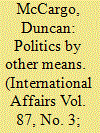

|
|
|
|
|
| Publication |
2011.
|
| Summary/Abstract |
This article argues that more emphasis should be placed on the political aspects of international tribunals, which are often in the business of reshaping politics as well as simply administering justice. By examining the hybrid Extraordinary Chambers in the Courts of Cambodia (ECCC), popularly known as the Khmer Rouge Tribunal, the article develops arguments previously advanced by Victor Peskin in respect of Rwanda and the former Yuogoslavia. Peskin has suggested that courtroom war crimes trials are paralleled by 'virtual trials', in which international and domestic political actors struggle for power and control over the form and outcome of proceedings. He terms these virtual trials 'trials of cooperation', in which governments of states where war crimes have been committed seek variously to help or hinder legal proceedings to address those crimes.
Such virtual trials now loom extremely large in the Cambodian case; the Hun Sen government, while exploiting the ECCC to deflect domestic and international attention from the endemic corruption and growing authoritarianism over which it presides, has sought tightly to limit the Tribunal's room for manoeuvre. One trial has been completed, another is about to start, and the international investigators and prosecutors are planning a couple more-but Prime Minister Hun Sen has personally declared his opposition to any further cases going ahead. If the ECCC succeeds in trying only five defendants from the murderous 1975-79 Khmer Rouge regime, justice will not have been done; and wider questions will emerge about the future viability of hybrid tribunals. The Cambodian case demonstrates that where war crimes tribunals are concerned, backroom 'virtual trials' need as much academic, policy and media attention as the actual courtroom trials of key defendants.
|
|
|
|
|
|
|
|
|
|
|
|
|
|
|
|
| 11 |
ID:
138503


|
|
|
|
|
| Summary/Abstract |
This article focuses on the experience of the Cham Muslim minority in the Cambodian holocaust, which almost obliterated them. It explores the impact of the United Nations/Royal Government of Cambodia’s hybrid tribunal system, the Extraordinary Chambers in the Courts of Cambodia (ECCC), on Cham cultural identity since the fall of the Democratic Kampuchean regime in 1979. In particular, it examines social and historical knowledge transfer between those who survived the regime and the generation born after 1979, and the respective roles of globalized Islam and the ECCC in addressing this knowledge transfer. It uses interviews with a Cham scholar, imams and community leaders, ECCC staff, and a lawyer who represents many Cham civil party clients at the Courts.
|
|
|
|
|
|
|
|
|
|
|
|
|
|
|
|
| 12 |
ID:
166672


|
|
|
|
|
| Summary/Abstract |
The genocide perpetrated by the Khmer Rouge between 1975 and 1979 appears as one of the most totalitarian manifestations of political violence in the 20th century. This article explores the ideological framework constructed by the Khmer Rouge, and looks into whether and how this influences and motivates individual low-level cadres in their participation. Our findings show that toxification as a genocidal ideology was present in the Khmer Rouge discourse, and provided a lens of legitimacy for individuals to engage in acts of violence. But such a genocidal ideology was not a motivating factor for individual perpetrators in the Cambodian genocide. This research forwards the comparative investigation of the Khmer Rouge genocide in Cambodia as an important case of genocide, both at the societal and individual levels, as well as the general study of toxification as a genocidal ideology.
|
|
|
|
|
|
|
|
|
|
|
|
|
|
|
|
|
|
|
|
|